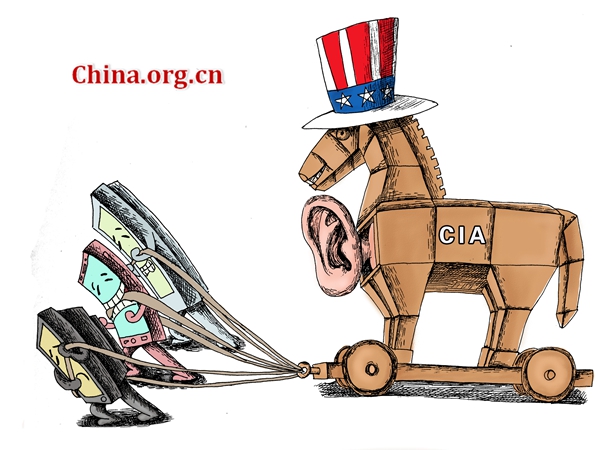Hacking China: WikiLeaks, Trump and cybersecurity
china.org.cn / chinagate.cn by Kyle Calandra, March 23, 2017 Adjust font size:
|
|
|
Hacking into everything [By Zhang Xueshi / China.org.cn] |
On March 7, a total of 8,761 new documents released by WikiLeaks exposed the global espionage activities of the CIA on an unprecedented scale.
WikiLeaks claimed the CIA had "lost control of the majority of its hacking arsenal." Andrew Blake, writing in the Washington Times, said the agency had refused to comment on the authenticity of the documents, but numerous reports indicate the leak is the subject of an investigation being undertaken by both the FBI and CIA.
In response, White House spokesman Sean Spicer said: "This alleged leak should concern every single American in terms of the impact it has on our national security;" at the same time, he refused to confirm or deny the documents' authenticity.
According to Reuters, China expressed immediate concern regarding the data that acknowledges the CIA can hack "all manner of devices, including those made by Chinese companies."
Specifically, the released documents reveal that the agency can infiltrate mobile phones, computers and even smart TV operating systems from Microsoft, Google, Apple and Samsung, many of which are made in China.
Chinese Foreign Ministry spokesman Geng Shuang said, "China is opposed to all forms of cyberattacks, and urges the U.S. side to stop listening in, monitoring, stealing secrets and internet hacking against China and other countries."
Tang Wei, a cybersecurity engineer and the marketing director of Beijing-based security company Rising, was quoted in an article in Business Insider as saying, "The American cyberwar machine has been operating undercover, and it is very difficult for an outsider to get a glimpse of what's happening inside. These documents merely reveal the tip of an iceberg."
America and China have a shared history of both cooperation and frustration when it comes to cybersecurity. Stewarded by President Obama and Chinese President Xi Jinping, the 2015 Cyber Agreement helped set a friendly precedent for either country when it comes to commercial cyber espionage.
However, the United States makes a distinction between cyber intrusions on behalf of national security, and those for commercial benefit.
Coupled with the existing ideological differences between the two sides, there is the added element of uncertainty surrounding the unpredictable nature of the current administration in Washington.
During the first presidential election debate last year, Trump declared: "Look at the mess that we're in. As far as the cyber… we should be better than anybody else. The security aspect of cyber is very, very tough. We have so many things that we have to do better… and certainly cyber is one of them."
On October 3, Trump seemed a little more coherent. He promised immediate action on cybersecurity if elected, asserting that the United States should "make cybersecurity a major priority for both the government and the private sector."
Once elected, however, his cybersecurity plans were inexplicably shelved.
On January 31, he was expected to sign an executive order detailing his position on cybersecurity. Writing in The Register, Kieren McCarthy describes a series of meetings held at the White House on the day when the executive order was supposed to be signed in the Oval Office. At the last minute, without explanation, the signing was called off.
With everyone looking for a clear sense of Trump's policy surrounding the issue, the administration seemed to fail another hurdle only weeks later.
From February 13-17, cybersecurity professionals met in San Francisco for the RSA Conference, an annual forum for sharing Internet security innovations. In an article for The Intercept, Jenna McLaughlin wrote, "Trying to find a representative from the three-week-old White House (at the event) is like playing a game of Where's Waldo. None appeared…and panels discussing cybersecurity policy worked off leaked drafts of an executive order abandoned by President Donald Trump's administration."
With an urgent call for the U.S. side to "stop stealing secrets and hacking China and other countries," China's Foreign Ministry spokesman Geng Shuang's comments hint that the WikiLeaks release might create greater leverage to help the country shift the cybersecurity debate within the international community in a direction of its choosing, especially with Trump having been incoherent, inactive and relatively mute on the subject.
According to Geng, "The Chinese side is firmly committed to safeguarding its cyber security and is ready to enhance dialogue and cooperation with the international community to lay down a set of universally acceptable rules governing cyberspace within the U.N. framework, and build a peaceful, secure, open, cooperative and orderly cyberspace through joint efforts."
With Trump's China policies already a subject of intense scrutiny, and his relative silence surrounding cybersecurity, how will America and Trump respond to this new furore?
Having previously lived in Beijing working as a journalist and editor, Kyle Calandra is currently based in America reporting on Sino-U.S. Relations as a contributor for China.org.cn.
Opinion articles reflect the views of their authors only, not necessarily those of China.org.cn.
